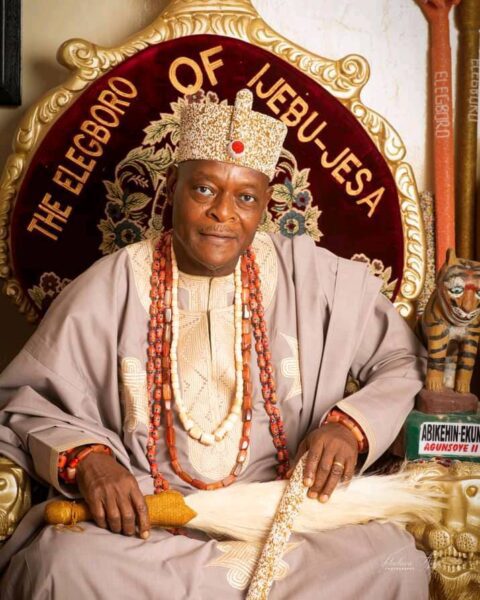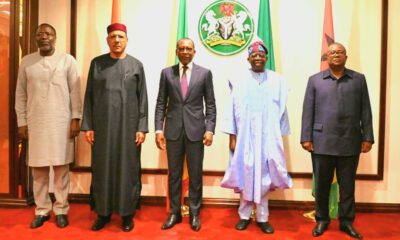National Issues
Obaship In An Era Of Palliatives -By Abiodun Komolafe
Without doubt, the Obaship institution in Nigeria, especially, in the Southwest is shifting and drifting. When society begins to drift, it continues in that trend, until there is a jerk to change the direction. But that doesn’t just happen! As if the gods are angry, the traditional institution is no longer as potent as it used to be. So, the central advice really is for all traditional rulers to rule according to the dictates of the native intelligence within their domains.

In an interview with journalists recently, the Elegboro of Ijebu-Jesa in the Oriade Local Government Area of Osun State, Oba Moses Oluwafemi Agunsoye stated that “no one can sit on the throne as a monarch nowadays without having good money”. According to the first class monarch, “gone are those days when people brought things to the palace, where the Kabiyesi would sit down and expect manna from heaven. Now, it is the palace that is giving out … So, an Oba must be up and doing, must have a job, or source of handsome income and he cannot rely on the people.”
On consultations with the deities before choosing a king, Oba Agunsoye said: “at times, traditionalists lie when choosing a king because money has exchanged hands. A rich man can be made a king once he pays the Ifa and the Ifa would speak in his favour, unlike those years when the truth is sacred and must be told at all times.”
To start with, when Oba Agunsoye said no one becomes an Oba without being wealthy, Kabiyesi was only joining the likes of the Awujale of Ijebuland, Oba Sikiru Adetona and Oluwo of Iwoland, Oba Abdulrosheed Akanbi in appropriately situating the fate that has tragically befallen the traditional institution in Nigeria. Talking philosophically, Elegboro was also inquiring about what might have been delaying the emergence of a new Soun of Ogbomoso and Alaafin of Oyo, close to two years after the demise of the occupants of the exalted thrones.
‘Different strokes for different folks’, goes the 20th century proverbial saying. Since society is not static, the relevance or otherwise of the traditional ruler has changed so much that many things now look bizarre. Well, the major crack is the unnoticeable changing nature of institutions in Nigeria. Often, all our approaches to modernity are seen as an attempt to repudiate the traditional core values of the society. Since it is not sharp, it moves piecemeal. As such, it is not all that noticeable. Yet, it is there! The first thing is that institutional changes come without much hubbub. In an ideal world, the Oba of a town is a man in three solid offices in which none is insignificant. He is by all accounts the political head, the traditional ruler and the spiritual leader of his people.
In a non-homogeneous society like ours, it is a traumatic responsibility. An Oba is the head of the Sango traditional worshippers. When the Christian community calls, the Oba shouldn’t be wanting. And whenever it’s the turn of the Muslims, the sacred king must also look for a kurfi and join the Ummah in making supplications to Allah. In a word, an Oba must just be who his subjects want him to be.
Hire and fire! Depose and jail! Needless to repeat that the traditional and the spiritual attributes of Obaship in Nigeria have become moribund and rubbished! Regrettably so, modernity has long rendered its political attribute impotent. Given the circumstances in Nigeria, the traditional institution could not have done better. In reality therefore, the traditional institution will have to reinvent itself; otherwise, troubled times loom. An example is the futile effort to reintegrate the traditional institution into politics; and it’s distancing its members from their ancestral core values.
When Oba Adeyeye Enitan Ogunwusi was to be crowned, all kinds of questionable and unimaginable insinuations occurred; but they were all dismissed, either for exigency or for political reasons. For example, Iyiola Omisore warned that the people should not allow Bola Tinubu to come from Lagos and impose Ooni Adimula on Ile-Ife. But that’s where the warning ended. Not even the traditional chiefs and/or handlers of the ancient throne of Ife listened to him. In the end, the Apesin Oodua of Ife lost the battle and Ojaja II emerged. The rest is history!
As things stand, one is at a loss of a blueprint of the roles and responsibilities of the traditional rulers and the definition of their powers in the Southwest. Of course, things have changed dramatically from what they were in not-so-distant past in Nigeria’s rich history, when the likes of Oba Adesoji Aderemi, Oba Olateru Olagbegi and Omo n’Oba N’Edo Uku Akpolokpolo, Erediauwa were here! Now, every Ife-born child, whether traditionally right or otherwise, wants to be a Sooko, a position hitherto reserved for apparent heirs to the throne; a position that’s supposed to be a product of initiation.
Let’s go to Ibadan and see what the traditional institution has become. Arguably, this is the first time the ancient city will be having a comprehensively educated and robustly enlightened monarch. Oba Moshood Olalekan Balogun participated in the politics of the 1970s as a young Ph.D. holder. Essentially Ibadan bred and born, Okumade II knows his onions. As a matter of fact, no one engages him in a debate and loses; one is bound to gain something from him. Again, this is where the media seems to have missed a vital opportunity: that Lekan Balogun became the Olubadan of Ibadanland and the Fourth Estate has done next-to-nothing in terms of tapping from the wealth of experience of this man of solid ideas who will always reveal stuff that will shake the entire country!
Time it was when Nigeria’s physical scenarios did not favour Olubadan Balogun, not because he was not qualified. The future 42nd Olubadan was only a target of the attitude of the elite and the judgment of fate! His Imperial Majesty was a victim of a society that was not ready for a man of his stature and status. Thank God for sparing his life. Now that he is the Olubadan, it’s time Kabiyesi revisited some of those brilliant ideas he used to discuss in the ‘70s. As a man with a deep sense of history, it behooves Oba Balogun to do his best to right some of the wrongs of the past.
So far, the most reassuring and settled order in the Southwest is the kingship order in Ijesaland; and that’s the truth! Take, for example, for a prince to emerge as Owa Obokun of Ijesaland, he has to perform certain traditional rites. It’s not just money! No! It’s not that an Omisore will have to turn into a protest merchant; or that a Tinubu will allegedly wake up on the other side of the bed and insist on a particular candidate as the next Owa Obokun of Ijesaland. No! It can’t happen in Ijesaland! Should anybody dare, then the Ijesas will stand against him; all hell will let loose because Ogendengbe Agbogungboro will wake up from his grave, fight the cause of his forebears and restore order; and society will calm down! Take it or leave it, society is not a detached object; it has an anchor to hold by and to hold to! Incontestably, these are the strictures that hold any rational society; and Ijesaland can’t afford to be different!
Without doubt, the Obaship institution in Nigeria, especially, in the Southwest is shifting and drifting. When society begins to drift, it continues in that trend, until there is a jerk to change the direction. But that doesn’t just happen! As if the gods are angry, the traditional institution is no longer as potent as it used to be. So, the central advice really is for all traditional rulers to rule according to the dictates of the native intelligence within their domains. In the considered opinion of yours sincerely, this is the best option!
May the Lamb of God, who takes away the sin of the world, grant us peace in Nigeria!
*KOMOLAFE writes in from Ijebu-Jesa, Osun State, Nigeria (ijebujesa@yahoo.co.uk









